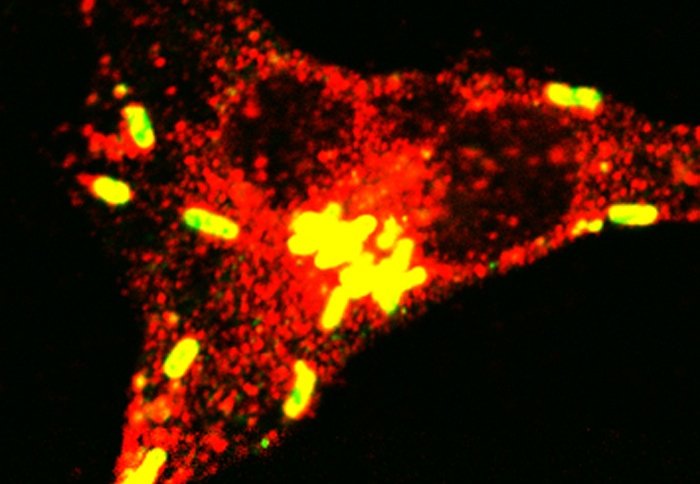Modified bacteria could be used in vaccines
by Sam Wong

Bacteria (yellow) inside a host cell. Injected proteins appear in red.
A modified strain of Salmonella could be used to efficiently deliver antigens, the key ingredients of vaccines, into human cells, a study suggests.
Salmonella bacteria use nanoscopic needles to inject their own proteins into host cells, enabling them to survive and replicate inside those cells. In the latest study, published in mBio, scientists harnessed this mechanism to deliver vaccine-like particles into immune cells using modified bacteria that are unable to replicate and cause infection.
“As our understanding of how bacteria grow in host cells has improved, it has enabled us to think about how we can manipulate them,” said Dr Rita Figueira, who carried out the study in Professor David Holden’s laboratory at the MRC Centre for Molecular Bacteriology and Infection at Imperial College London.
“Salmonella carry needles that they use to inject proteins into host cells to enable them to replicate. These needles make them perfect delivery systems for vaccinal molecules as they can inject antigens directly into human cells to trigger a strong immune response. We’ve shown that it’s possible to create bacteria that are unable to replicate but can inject proteins we want it to inject into host cells,” said Dr Sophie Helaine, who is corresponding author of this study.
To work out how to disarm Salmonella while preserving the function of the needles, Dr Figueira studied the effects of mutations in 32 genes encoding proteins that the bacteria inject into host cells. Ten of these mutations affected the bacteria’s ability to replicate in mouse immune cells grown in the lab. A strain with a combination of three mutations was more severely impaired in its ability to replicate. But these bacteria were still able to inject antigens into host cells and trigger a strong immune response.
“It will be important to get the right balance between hindering replication so that the bacteria are less harmful and retaining the ability to provoke good immune responses,” said Dr Helaine. “So we need to do more work to develop this as a method for delivering vaccines, but this study suggests that the concept is sound.”
“Salmonella can also target cancer cells, which would make it a good way to administer therapeutic molecules directly into tumours.”
The study was funded by the Medical Research Council, the Wellcome Trust, and the Fundação para a Ciência e a Tecnologia, Portugal.
Reference
Figueira R, Watson KG, Holden DW, Helaine S. 2013. Identification of Salmonella pathogenicity island-2 type III secretion system effectors involved in intramacrophage replication of S. enterica serovar Typhimurium: implications for rational vaccine design. mBio 4(2):e00065-13. doi:10.1128/mBio.00065-13.
Article supporters
Article text (excluding photos or graphics) © Imperial College London.
Photos and graphics subject to third party copyright used with permission or © Imperial College London.
Reporter
Sam Wong
School of Professional Development